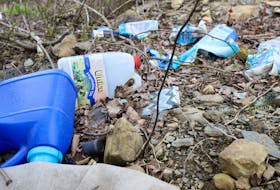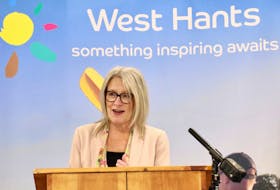
“Through technology like MRI’s (Magnetic Resonance Imaging), we know a lot more about the development of children’s brains and the impact of adverse events,” said Amherst’s Betsy Prager, a clinical therapist with Addiction Services at the Cumberland Health Authority.
Brain imaging technology was still in its infancy when the first edition of Reaching Out: Working Together to Identify and Respond to Child Victims of Abuse was published in 1998.
“In Sept. 2013, the publisher got in touch with myself and my co-author (Pearl Rimer) because there were requests from people using the book to have it updated,” said Prager. “The first edition was published in 1998 and it’s been used in colleges and universities. It’s a text used in courses for people who are going to be working with children.”
The book has sold about 2,000 copies each year for the past 17 years.
The second edition was published this week, and Prager donated a copy to the Four Fathers Library Wednesday afternoon.
“We’re donating a copy to the library and to Maggie’s Place and the Cumberland Sexual Health Centre,” said Prager.
A research study called the Adverse Childhood Experiences Study has also had a large impact on the study of childhood development since 1998.
“The Adverse Childhood Events Study looked at the impact of all kinds of adverse events on childhood development, such as the impact of childhood abuse on the development of the childhood brain,” said Prager. “Abuse impacts attachment and develops attachment disorders.”
The Internet has had an impact on child abuse, both negative and positive.
“There is a lot of updated information in the new edition about the internet and electronic abuse, about child abuse using electronic and social media.”
The Internet has also created a greater awareness of child abuse issues.
“There are a lot of chat groups and online support groups for survivors or those people who have similar experiences,” said Chantelle Taylor, deputy chief librarian at the Four Fathers Library.
Prager agrees, saying people are more open about the issue of childhood abuse than they were in the past.
“Children are disclosing much more quickly now and people are more willing to hear about it. It’s more acceptable to talk about now,” said Prager. “In the 80’s and 90’s people spent many year’s suffering in silence before they talked about it.”
Ultimately, it’s up to adults in our community to stop child abuse.
“We’re very careful in the book to let people know it’s an adult responsibility to prevent abuse,” said Prager. “We all have to be responsible to take care of children.”
A world free of child abuse probably won’t happen any time soon, but Prager says, “Let’s hope we can someday have a society free of child abuse. Let’s hope.”








